
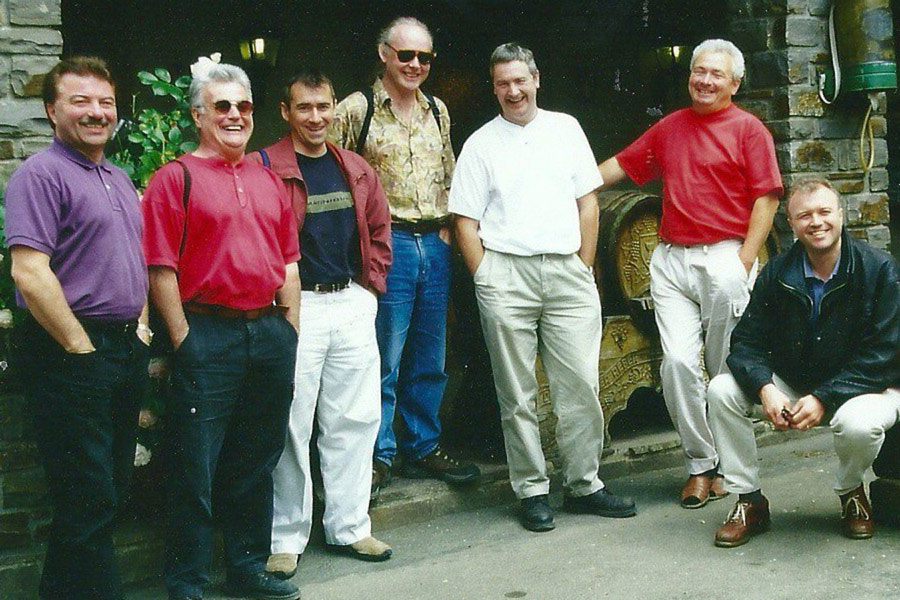
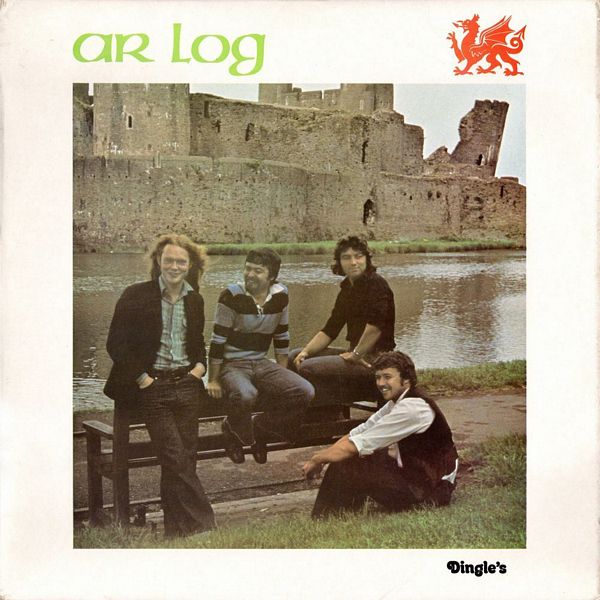 |
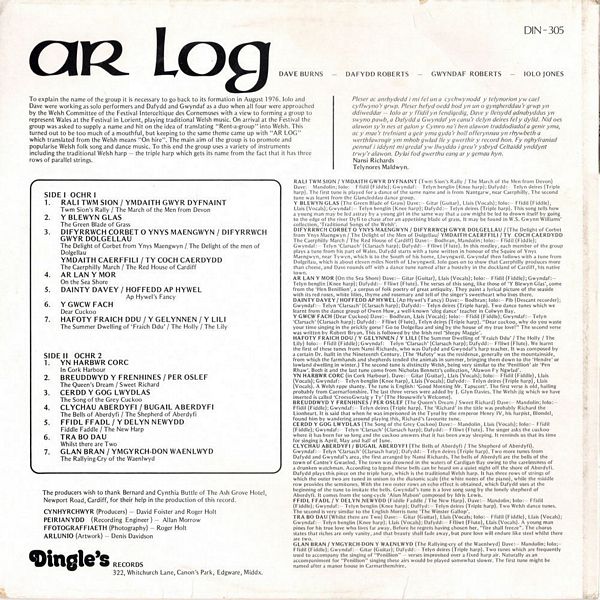
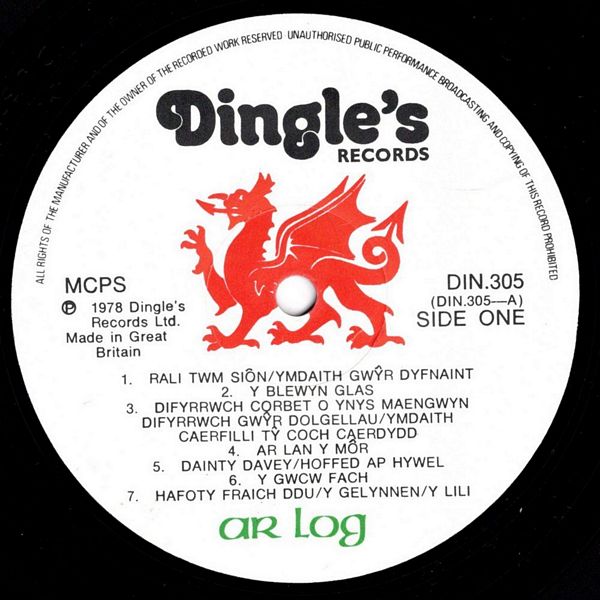
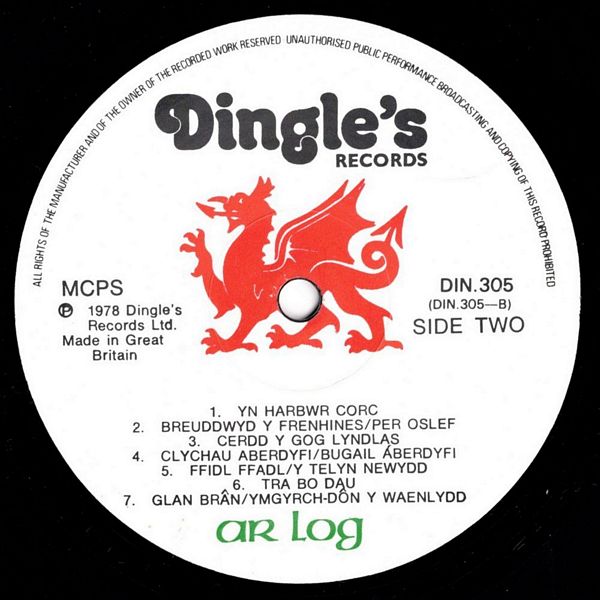
|
Sleeve Notes
To explain the name of the group it is necessary to go back to its formation in August 1976 Iolo and Dave were working as solo performers and Dafydd and Gwyndaf as a duo when all four were approached by the Welsh Committee of the Festival Interceltique des Cornemuses with a view to forming a group to represent Wales at the Festival in Lorient, playing traditional Welsh music. On arrival at the Festival the group was asked to supply a name and hit on the idea of translating "Rent-a-group" into Welsh. This turned out to be too much of a mouthful, but keeping to the same theme came up with "AR LOG" which translated from the Welsh means "On hire". The main aim of the group is to promote and popularise Welsh folk song and dance music. To this end the group uses a variety of instruments including the traditional Welsh harp - the triple harp which gets its name from the fact that it has three rows of parallel strings.
RALI TWM SION, YMDAITH GWYR DYFNAINT (Twm Sion's Rally, The March of the Men from Devon)
Dave: Mandolin; Iolo: Ffidil (Fiddle) Gwyndaf: Telyn benglin (Knee harp) Dafydd: Telyn deires (Triple harp).
The first tune is played for a dance of the same name and is from Nantgarw, near Caerphilly. The second tune was learnt from the Glancleddau dance group.
Y BLEWYN GLAS (The Green Blade of Grass)
Dave: Gitar (Guitar), Llais (Vocals) Iolo: Ffidil (Fiddle), Llais (Vocals) Gwyndaf: Telyn benglin (Knee harp) Dafydd: Telyn deires (Triple harp).
This song tells how a young man may be led astray by a young girl in the same way that a cow might be led to drown itself by going to the edge of the river Dyfi to chase after an appetising blade of grass. It may be found in W.S. Gwynn Williams' collection, 'Traditional Songs of the Welsh'.
DIFYRRWCH CORBET O YNYS MAENGWYN, DIFYRRWCH GWYR DOLGELLAU (The Delight of Corbet from Ynys
Maengwyn, The Delight of the Men of Dolgellau) YMDAITH CAERFFILI, TY COCH CAERDYDD The Caerphilly March, The Red House of Cardiff)
Dave: Bodhrán, Mandolin; Iolo: Ffidil (Fiddle) Gwyndaf: Telyn 'Clarsach' (Clarsach harp) Dafydd: Ffliwt (Flute).
In this medley, each member of the group plays a tune from his part of Wales. Dafydd starts with a tune written in honour of the Squire of Ynys Maengwyn, near Tywyn, which is to the South of his home, Llwyngwril. Gwyndaf then follows with a tune from Dolgellau, which is about eleven miles North of Llwyngwril. lolo goes on to show that Caerphilly produces more than cheese, and Dave rounds off with a dance tune named after a hostelry in the dockland of Cardiff, his native town.
AR LAN Y MOR (On the Sea Shore)
Dave: Gitar (Guitar), Llais (Vocals) Iolo: Ffidil (Fiddle) Gwyndaf: Telyn benglin (Knee harp) Dafydd: Ffliwt (Flute).
The verses of this song, like those of 'Y Blewyn Glas', come from the 'Hen Benillion", a corpus of folk poetry of great antiquity. They paint a lyrical picture of the seaside with its red roses, white lilies, thyme and rosemary and tell of the singer's sweetheart who lives there.
DAINTY DAVEY/ HOFFEDD AP HYWEL (Ap Hywel's Fancy)
Dave: Bodhrán; Iolo: Pib (Descant recorder) Gwyndaf: Telyn 'Clarsach' (Clarsach harp) Dafydd: Telyn deires (Triple harp).
Two dance tunes which we learnt from the dance group of Owen Huw, a well-known 'clog dance' teacher in Colwyn Bay.
Y GWCW FACH (Dear Cuckoo)
Dave: Bodhrán, Llais (Vocals) Iolo: Ffidil (Fiddle) Gwyndaf: Telyn 'Clarsach' (Clarsach harp) Dafydd: Ffliwt (Flute), Telyn deires (Triple harp).
"Dear cuckoo, why do you waste your time singing in the prickly gorse? Go to Dolgellau and sing" by the house of my true love!" The second verse was written by Robert Bryan. This is followed by the Irish reel 'Sleepy Maggie'.
HAFOTY FRAICH DDU, Y GELYNNEN, Y LILI (The Summer Dwelling of 'Fraich Ddu', The Holly, The Lily)
Iolo: Ffidil (Fiddle) Gwyndaf: Telyn 'Clarsach' (Clarsach harp) Dafydd: Ffliwt (Flute).
We learnt the first of these tunes from Nansi Richards, who was Dafydd and Gwyndaf's harp teacher. It was composed by a certain Dr. Isallt in the Nineteenth Century. (The 'Hafoty' was the residence, generally on the mountainside, from which the farmhands and shepherds tended the animals in summer, bringing them down to the 'Hendre' or lowland dwelling in winter.) The second tune is distinctly Welsh, being very similar to the 'Penillion' air 'Pen Rhaw'. Both it and the last tune come from Nicholas Bennett's collection, 'Alawon Fy Ngwlad'.
YN HARBWR CORC (in Cork Harbour).
Dave: Gitar (Guitar), Llais (Vocals) Iolo: Ffidil (Fiddle), Llais (Vocals) Gwyndaf: Telyn benglin (Knee harp), Llais (Vocals) Dafydd: Telyn deires (Triple harp), Llais (Vocals).
A Welsh rope shanty. The tune is English: 'Good Morning Mr. Tapscott'. The first verse is old, hailing probably from Caernarfonshire. The last three verses were added by J. Glyn Davies. The Welsh jig which we have
inserted is called 'Croeso Gwraig y Ty' (The Housewife's Welcome).
BREUDDWYD Y FRENHINES, PER OSLEF (The Queen's Dream, Sweet Richard)
Dave: Mandolin; Iolo: Ffidil (Fiddle) Gwyndaf: Telyn deires (Triple harp).
The 'Richard' in the title was probably Richard the Lionheart. It is said that when he was imprisoned in the Tyrol by the emperor Henry IV, his harpist, Blonde!, found him by wandering around playing this, Richard's favourite tune.
CERDD Y GOG LWYDLAS (The Song of the Grey Cuckoo)
Dave: Mandolin, Llais (Vocals) Iolo: Ffidil (Fiddle) Gwyndaf: Telyn 'Clarsach' (Clarsach harp) Dafydd: Ffliwt (Flute).
The singer asks the cuckoo where it has been for so long and the cuckoo answers that it has been away sleeping. It reminds us that its time for singing is April, May and half of June.
CLYCHAU ABERDYFI, BUGAIL ABERDYFI (The Bells of Aberdyfi, The Shepherd of Aberdyfi).
Gwyndaf: Telyn 'Clarsach' (Clarsach harp) Dafydd: Telyn deires (Triple harp).
Two more tunes from Dafydd and Gwyndaf's area, the first arranged by Nansi Richards. The bells of Aberdyfi are the bells of the town of Cantre'r Gwaelod. The town was drowned in the waters of Cardigan Bay owing to the carelessness of a drunken watchman. According to legend these bells can be heard on a quiet night off the shore of Aberdyfi. Dafydd plays this piece on the triple harp, which is the traditional Welsh harp. It has three rows of strings of which the outer two are tuned in unison to the diatonic scale (the white notes of the piano), while the middle row provides the semitones. With the two outer rows an echo effect is obtained, which Dafydd uses at the beginning of the tune to imitate the bells. Gwyndaf's tune is a love song sung by the lonely shepherd of Aberdyfi. It comes from the song-cycle 'Alun Mabon' composed by Idris Lewis.
FFIDL FFADL, Y DELYN NEWYDD (Fiddle Faddle, The New Harp).
Dave: Mandolin; Iolo: Ffidil (Fiddle) Gwyndaf: Telyn benglin (Knee harp) Daffyd: Telyn deires (Triple harp).
Two Welsh dance tunes. The second is very similar to the English Morris tune 'The Winster Gallop'.
TRA BO DAU (Whilst there are Two)
Dave: Gitar (Guitar), Llais (Vocals; Iolo: Ffidil (Fiddle), Llais (Vocals) Gwyndaf: Telyn benglin (Knee harp) Llais (Vocals) Dafydd: Ffliwt (Flute), Llais (Vocals).
A young man pines for his true love who lives far away. Before he regrets having chosen her, "fire shall freeze". The chorus states that riches are only vanity, and that beauty shall fade away, but pure love will endure like steel whilst there are two.
GLAN BRAN, YMGYRCH-DON Y WAENLWYD (The Rallying-cry of the Waenlwyd)
Dave: Mandolin; Iolo:- Ffidil (Fiddle) Gwyndaf: Gitar (Guitar) Dafydd: Telyn deires (Triple harp).
Two tunes which are frequently used to accompany the singing of "Penillion" — verses improvised over a fixed harp air. Naturally as an accompaniment for "Penillion" singing these airs would be played somewhat slower. The first tune might be named after a manor house in Carmarthenshire.